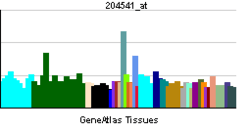SEC14L2
| SEC14-like 2 (S. cerevisiae) | |||||||||||||
|---|---|---|---|---|---|---|---|---|---|---|---|---|---|
 PDB rendering based on 1o6u. | |||||||||||||
| |||||||||||||
| Identifiers | |||||||||||||
| Symbols | SEC14L2 ; C22orf6; SPF; TAP; TAP1 | ||||||||||||
| External IDs | OMIM: 607558 MGI: 1915065 HomoloGene: 8245 GeneCards: SEC14L2 Gene | ||||||||||||
| |||||||||||||
| RNA expression pattern | |||||||||||||
 | |||||||||||||
| More reference expression data | |||||||||||||
| Orthologs | |||||||||||||
| Species | Human | Mouse | |||||||||||
| Entrez | 23541 | 67815 | |||||||||||
| Ensembl | ENSG00000100003 | ENSMUSG00000003585 | |||||||||||
| UniProt | O76054 | Q99J08 | |||||||||||
| RefSeq (mRNA) | NM_001204204 | NM_144520 | |||||||||||
| RefSeq (protein) | NP_001191133 | NP_653103 | |||||||||||
| Location (UCSC) | Chr 22: 30.79 – 30.82 Mb | Chr 11: 4.1 – 4.12 Mb | |||||||||||
| PubMed search | |||||||||||||
SEC14-like protein 2 is a protein that in humans is encoded by the SEC14L2 gene.[1][2]
Function
This gene encodes a cytosolic protein which belongs to a family of lipid-binding proteins including Sec14p, alpha-tocopherol transfer protein, and cellular retinol-binding protein. The encoded protein stimulates squalene monooxygenase which is a downstream enzyme in the cholesterol biosynthetic pathway.[2]
References
- ↑ Dunham I, Shimizu N, Roe BA, Chissoe S, Hunt AR, Collins JE et al. (Dec 1999). "The DNA sequence of human chromosome 22". Nature 402 (6761): 489–95. doi:10.1038/990031. PMID 10591208.
- ↑ 2.0 2.1 "Entrez Gene: SEC14L2 SEC14-like 2 (S. cerevisiae)".
Further reading
- Caras IW, Friedlander EJ, Bloch K (1980). "Interactions of supernatant protein factor with components of the microsomal squalene epoxidase system. Binding of supernatant protein factor to anionic phospholipids". J. Biol. Chem. 255 (8): 3575–80. PMID 7364757.
- Maruyama K, Sugano S (1994). "Oligo-capping: a simple method to replace the cap structure of eukaryotic mRNAs with oligoribonucleotides". Gene 138 (1–2): 171–4. doi:10.1016/0378-1119(94)90802-8. PMID 8125298.
- Solheim JC, Harris MR, Kindle CS, Hansen TH (1997). "Prominence of beta 2-microglobulin, class I heavy chain conformation, and tapasin in the interactions of class I heavy chain with calreticulin and the transporter associated with antigen processing". J. Immunol. 158 (5): 2236–41. PMID 9036970.
- Suzuki Y, Yoshitomo-Nakagawa K, Maruyama K, Suyama A, Sugano S (1997). "Construction and characterization of a full length-enriched and a 5'-end-enriched cDNA library". Gene 200 (1–2): 149–56. doi:10.1016/S0378-1119(97)00411-3. PMID 9373149.
- "Toward a complete human genome sequence". Genome Res. 8 (11): 1097–108. 1999. doi:10.1101/gr.8.11.1097. PMID 9847074.
- Hirosawa M, Nagase T, Ishikawa K, Kikuno R, Nomura N, Ohara O (2000). "Characterization of cDNA clones selected by the GeneMark analysis from size-fractionated cDNA libraries from human brain". DNA Res. 6 (5): 329–36. doi:10.1093/dnares/6.5.329. PMID 10574461.
- Zimmer S, Stocker A, Sarbolouki MN, Spycher SE, Sassoon J, Azzi A (2000). "A novel human tocopherol-associated protein: cloning, in vitro expression, and characterization". J. Biol. Chem. 275 (33): 25672–80. doi:10.1074/jbc.M000851200. PMID 10829015.
- Shibata N, Arita M, Misaki Y, Dohmae N, Takio K, Ono T et al. (2001). "Supernatant protein factor, which stimulates the conversion of squalene to lanosterol, is a cytosolic squalene transfer protein and enhances cholesterol biosynthesis". Proc. Natl. Acad. Sci. U.S.A. 98 (5): 2244–9. doi:10.1073/pnas.041620398. PMC 30123. PMID 11226224.
- Hirosawa M, Nagase T, Murahashi Y, Kikuno R, Ohara O (2001). "Identification of novel transcribed sequences on human chromosome 22 by expressed sequence tag mapping". DNA Res. 8 (1): 1–9. doi:10.1093/dnares/8.1.1. PMID 11258795.
- Yamauchi J, Iwamoto T, Kida S, Masushige S, Yamada K, Esashi T (2001). "Tocopherol-associated protein is a ligand-dependent transcriptional activator". Biochem. Biophys. Res. Commun. 285 (2): 295–9. doi:10.1006/bbrc.2001.5162. PMID 11444841.
- Stocker A, Tomizaki T, Schulze-Briese C, Baumann U (2003). "Crystal structure of the human supernatant protein factor". Structure 10 (11): 1533–40. doi:10.1016/S0969-2126(02)00884-5. PMID 12429094.
- Singh DK, Mokashi V, Elmore CL, Porter TD (2003). "Phosphorylation of supernatant protein factor enhances its ability to stimulate microsomal squalene monooxygenase". J. Biol. Chem. 278 (8): 5646–51. doi:10.1074/jbc.M211750200. PMID 12454003.
- Kempná P, Zingg JM, Ricciarelli R, Hierl M, Saxena S, Azzi A (2004). "Cloning of novel human SEC14p-like proteins: ligand binding and functional properties". Free Radic. Biol. Med. 34 (11): 1458–72. doi:10.1016/S0891-5849(03)00173-4. PMID 12757856. Vancouver style error (help)
- Stocker A, Baumann U (2003). "Supernatant protein factor in complex with RRR-alpha-tocopherylquinone: a link between oxidized Vitamin E and cholesterol biosynthesis". J. Mol. Biol. 332 (4): 759–65. doi:10.1016/S0022-2836(03)00924-0. PMID 12972248.
- Mokashi V, Singh DK, Porter TD (2004). "Rat supernatant protein factor-like protein stimulates squalene monooxygenase and is activated by protein kinase A". Biochem. Biophys. Res. Commun. 316 (3): 688–92. doi:10.1016/j.bbrc.2004.02.103. PMID 15033454.
- Collins JE, Wright CL, Edwards CA, Davis MP, Grinham JA, Cole CG et al. (2005). "A genome annotation-driven approach to cloning the human ORFeome". Genome Biol. 5 (10): R84. doi:10.1186/gb-2004-5-10-r84. PMC 545604. PMID 15461802.
- Cheng J, Kapranov P, Drenkow J, Dike S, Brubaker S, Patel S et al. (2005). "Transcriptional maps of 10 human chromosomes at 5-nucleotide resolution". Science 308 (5725): 1149–54. doi:10.1126/science.1108625. PMID 15790807.
| |||||||||||

